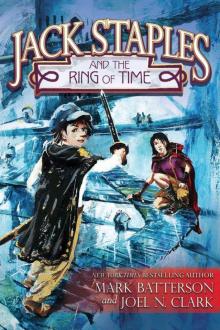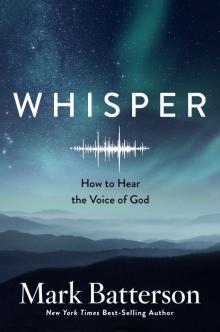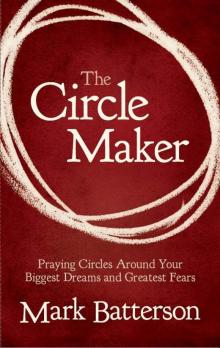- Home
- Mark Batterson
Whisper Page 17
Whisper Read online
Page 17
Have you ever been offered a free one-year subscription to a magazine? Magazines are so generous, right? Wrong! Magazine companies and cell phone companies and cable television companies and credit card companies all understand the status-quo bias. After the introductory offer is over, you’ll forget to cancel. And even if you don’t forget, you’re too lazy to make a phone call to cancel the product or service. It’s human nature to keep doing what you’ve been doing, and here’s the problem: if you keep doing what you’ve always done, you’ll keep getting what you’ve always gotten. To expect otherwise is the definition of insanity.
The status-quo bias is a major impediment to spiritual growth. And if we aren’t careful, it’ll keep us from discerning God’s promptings.
In computer science, default settings are automatically assigned to software applications, computer programs, and smartphones. Those out-of-the-box settings are called presets, and their purpose is to establish a protocol to optimize performance.
In much the same way, we all have default settings that dictate a lot of what we do. From the way we wake up, to the way we eat, to the way we interact with others, so many dimensions of our lives become patterned. A handful of default settings dictate our thoughts and actions. And the good news is this: a small change in a preset can have a huge change in outcome.
A few years ago I was trying to drop a few pounds, but I was having the hardest time shedding the weight. I was venting to a friend of mine while drinking a Venti Caramel Macchiato at Starbucks one night when he looked down at my drink and said, “You know you’re sabotaging yourself, right?” A Venti Caramel Macchiato is 250 calories, and that was my second one of the day! So what did I do? I did the only thing I could do if I wanted to lose weight: I changed my default drink.
Heeding a little prompting today can have a huge net effect tomorrow.
The Nudge Unit
In 2010 the British government tasked a seven-person team with improving government programs based upon behavioral science. Formally called the Behavioural Insights Team, it became known as the Nudge Unit. The team was given a modest budget, and a sunset clause ensured that their experiment could be halted if they didn’t see any results.
The team leader, David Halpern, gave his first official report twenty months into David Cameron’s administration as prime minister. The cabinet secretaries were a little cynical, but Halpern won them over with four slides. The first slide showed that a very small edit in language increased the collection of taxes by tens of millions of pounds. The second slide noted that the best way to get people to insulate their attics was to offer an “attic clearance service.” The third slide revealed that including the image of a car captured by a roadside camera significantly increased the payment of traffic violations. And the fourth slide showed that sending texts to perpetrators who had overdue fines doubled the response rate.32
The name Nudge Unit was a tip of the cap to authors Richard Thaler and Cass Sunstein, who coined the concept with their best-selling book Nudge. A nudge is a means of encouraging and guiding behavior without mandating or instructing it. And it’s evidence that small changes in input can make dramatic differences in outcome.
The classic example is the men’s restroom at Schiphol Airport in Amsterdam. The restroom designer, Aad Kieboom, etched the image of a black housefly into each urinal, which reduced spillage by 80 percent. According to Kieboom, “If a man sees a fly, he aims at it.”33
Another fun example is on Chicago’s Lake Shore Drive. When drivers fail to observe the speed limit of twenty-five miles per hour, the series of S curves is quite dangerous. So what did the city of Chicago do? They painted a series of white stripes progressively closer and closer together before the curve, giving the sensation that one is actually speeding up. The natural reaction? To slow down.34
“When we drive on this familiar stretch of road,” noted Thaler and Sunstein, “we find that those lines are speaking to us, gently urging us to touch the brake before the apex of the curve. We have been nudged.”35
In my experience God gently nudges us in much the same way. A fleeting thought here, a surge of adrenaline there. Or, as for David Wilkerson, a little restlessness here or a lot of anguish there. Thaler and Sunstein have a name for those who design nudges: choice architects.36 And no one is better at it than the Holy Spirit.
When God prompts you to pray, pray.
When God prompts you to serve, serve.
When God prompts you to give, give.
God is setting you up, but you have to obey the prompting. And your obedience—whether it’s praying, serving, or giving—might just be somebody else’s miracle.
Seth Bolt makes a living by creating music and performing in cities all over the world with the band Needtobreathe. That’s his passion and his calling. What many people don’t know, however, is that when Seth isn’t working for the band, he and his wife, Tori, have a side project they are passionate about as well. In 2015 Seth and his father built a luxury tree house in upstate South Carolina. It was there that Seth and Tori were married and celebrated their honeymoon, and since then the tree house has been a blessing to guests who have come from around the world to stay and sway in its branches.
Not long after their wedding, Seth and Tori dreamed of building tree houses of their own in Charleston, South Carolina. They not only wanted a place to retreat when they are off the road but a place where others could come to reconnect with God. After reading The Circle Maker, Seth and Tori started circling a thirty-acre property near Charleston on Wadmalaw Island. They absolutely fell in love with the property and its moss-covered oaks, but that’s when reality hit. The price tag was outside their budget, way outside their budget. They could afford only half the land, but a bidding war had produced full-price offers for the entire property. That’s when Seth and Tori felt prompted to take a step of faith.
Before I share the rest of the story, let me share a few convictions. Faith doesn’t ignore reality, including financial reality. Faith counts the cost—actual costs and opportunity costs. But when things don’t add up, faith doesn’t always walk away in defeat. Faith knows that God can make up the difference, no matter how big a difference it is. Why? Because God owns the cattle on a thousand hills! And when God gives the vision, He makes provision.
For more than a year, Seth and Tori searched for their piece of promised land, and they asked God to give them a sign. Their fleece? They prayed that God would send a bald eagle. On the day they had to make one of the most difficult decisions of their lives—make an offer or walk away—an eagle landed on one of those mossy oaks about fifty feet from them. Seth and Tori knew it wasn’t mere coincidence. It was providence. By faith they signed the contract. And when they finished signing, the bald eagle flew away. Can you say divine timing? But that’s not nearly as amazing as what happened the very next day.
What Seth and Tori didn’t know when they took that step of faith is they weren’t the only ones circling the thirty acres in prayer. Another couple was circling the same property at the same time, but they weren’t circling it to buy it. They were simply circling it for God’s plans, God’s purposes. When this couple, whom Seth and Tori had met only once and briefly, discovered the Bolts’ God-given dream for the property, this couple offered to give them the difference! Notice the word give, not lend. Who does that? Who gives virtual strangers a significant chunk of change to make their dream come true? I’ll tell you who—someone who listens to and obeys the still small voice of God.
In Tori’s words, “You can’t make this stuff up! God answers prayer!”
Sixty Seconds Flat
I’ve shared my bravest prayer and a few unanswered prayers. Let me also share what might be the fastest answer to prayer ever! When we first moved to Washington, I directed an inner-city parachurch ministry called the Urban Bible Training Center. Lora and I were living paycheck to paycheck, or maybe I should say offering to offering since
I was an itinerant preacher. And the ministry wasn’t even close to being self-supporting when I felt a prompting to give to another parachurch ministry in the city. The prompting didn’t make sense financially. How can you give what you don’t have? It took as much faith as I had to write a $350 check, and I had to shut down my logical left brain long enough to drop the check in the mailbox outside the post office.
After dropping it off, I went inside to retrieve my mail from our post office box. Inside the box was a letter from the Mustard Seed Foundation with a check for $10,000. That’s a 2,857 percent return in sixty seconds flat.
I don’t believe in “name it, claim it.”
I don’t believe you can outgive God either.
When sixty seconds is all that separates giving and receiving, it’s hard to miss the cause and effect. It was a Luke 6:38 moment: “Give, and it will be given to you. A good measure, pressed down, shaken together and running over, will be poured into your lap. For with the measure you use, it will be measured to you.”
God is not a slot machine. And the reward we’re looking for is eternal, not material. But He cannot be outgiven. If you give for the wrong reasons, it doesn’t count in His kingdom. But if you give for the right reasons, it’s game on! The mailbox at 45 L Street NW is one of my burning bushes. God whispered, loud and clear!
The Power of a Single Prompting
Now let me double back to David Wilkerson. After obeying the prompting to move to New York City, Wilkerson led the head of the infamous Mau Maus gang, Nicky Cruz, to Christ. John Sherrill, an editor at Guideposts, turned that testimony into the first multipart story that magazine had ever published. And that Guideposts story eventually became The Cross and the Switchblade, a New York Times bestseller that sold more than fifteen million copies.
As an author, I love the way this book deal went down, and it’s a testament to the power of a single prompting. Instead of seeking a Christian publisher, David Wilkerson and John Sherrill approached Bernard Geis, one of the pioneers of sensational publishing in the 1960s. Geis was on the cusp of releasing Helen Gurley Brown’s Sex and the Single Girl, a book that would sell two million copies in its first three weeks!37 He was a master of staging stunts and creating controversy to sell copies, so what would a publisher like that want with a preacher like David Wilkerson?
Landing a contract was a long shot, to say the least. So Wilkerson told Sherrill that he wanted to put a fleece before the Lord. Sherrill didn’t even know what a fleece was. Wilkerson did exactly what I did when we explored the language of doors. He explained the way Gideon discerned the will of God by giving Him very specific and practical conditions by which to reveal His will.
Wilkerson laid down two fleeces in prayer before the Lord. The first fleece was that Geis, a very busy executive, would be able to meet with them that same day—a Friday. If you’ve ever submitted a book proposal, you know that pub boards don’t work that way. It’s usually a much longer process. The second fleece was that Geis would offer them a $5,000 advance on the spot. “That doesn’t sound like much,” said Sherrill in retrospect, “but back then you could buy a house with it.”38
The first condition was met when Geis offered them ten minutes that afternoon, but he seemed nonplussed by their pitch. What got his attention? He genuinely admired Wilkerson’s guts in risking his life to reach the gangs of New York, and although Geis was irreligious, he couldn’t believe that gang members and heroin addicts were finding religion. “Write up a proposal,” said Geis. “If it’s a go, I’ll give you five thousand dollars.”39
But the story doesn’t end there.
Goose Bumps
In 1968 a Hollywood actor and singer named Pat Boone read the book that Bernard Geis published. In Boone’s words, “I got goose bumps.”40 I’ve already outlined what I call the Goose-Bump Test, but let me take it one step further. Physiologically, goose bumps are an involuntary reaction to a strong emotion. In this instance I believe they were the initial physical evidence of a spiritual stirring. That feeling is a prompting. And it led to a film version of The Cross and the Switchblade, in which Pat Boone played the role of David Wilkerson. The Hollywood Foreign Press Association didn’t give the movie a Golden Globe, but it ranks as one of the most watched films in the world, viewed by fifty million people in 150 countries.41 And it started with goose bumps.
I realize that goose bumps might not be a litmus test for intellectual types, and I don’t recommend making life-altering decisions in an emotionally heightened state. But don’t discount intuition either. In fact, pay close attention to the things that make your hair stand on end.
Linda Kaplan Thaler is the advertising guru responsible for the little jingle “I don’t wanna grow up, I’m a Toys R Us kid.” She also came up with “Kodak moments.”42 How does Linda discern good ideas from duds? Without a hint of apology, she said, “Chills are how I ran the Kodak business.”43
I would highly recommend test marketing, strategizing, and planning. But some of the best ideas in business start out as goose bumps. And that’s true of the Father’s business as well. Goose bumps aren’t one of the seven love languages I outline in this book, but they’re a subdialect. Don’t ignore those things that give you chills. Perhaps you’re hearing from the same Holy Spirit who “warmed” the heart of John Wesley.
It’s impossible to calculate the full impact of anyone’s life because our influence outlives us. That’s true of a film, a book, or an organization as well. But I think it’s fair to say that David Wilkerson’s influence exceeded his wildest imagination. And like so many miracles, it started as a whisper. If he had ignored the prompting that came through that 1958 Life article, how many subsidiary stories would have gone untold? The same goes for Pat Boone’s prompting that came via those goose bumps.
At the end of our lives, we’ll all have our fair share of regrets because of the mistakes we’ve made. But I bet we’ll regret even more the opportunities we missed. That’s how and why and when we fall short of God’s glory. So how do we make sure we don’t miss those God-ordained opportunities? We have to turn up the volume on the still small voice of God and make sure He’s the loudest voice in our lives.
JOYSTICK
The Seventh Language: Pain
In the towns of Judah and the streets of Jerusalem that are deserted, inhabited by neither people nor animals, there will be heard once more the sounds of joy and gladness.
—JEREMIAH 33:10–11
Martin Pistorius was a happy, healthy little boy. But when he was twelve, a mysterious illness left him comatose for three years. When he finally woke up, he was unable to move, unable to speak. Locked-in syndrome paralyzes all the voluntary muscles in the body with one curious exception: vertical eye movement. Martin was reduced to a persistent vegetative state. Specialists told his parents that he had zero intelligence, zero awareness. The specialists were wrong, but Martin had no way of proving it. He had no capacity to communicate his thoughts or feelings with the outside world; he was a prisoner trapped inside his own body.
Martin was dropped off at a medical care center day after day, week after week, month after month for thirteen and a half years. When he was force-fed scalding-hot food, he couldn’t voice how much it hurt. When he needed assistance, he couldn’t even cry like a baby. And because the specialists thought his intelligence level was that of a toddler, Martin was placed in front of a television tuned to Barney & Friends and Teletubbies.
A silent witness to the world around him, Martin felt totally alone, totally powerless. Well, almost. “I was completely entombed,” says Martin in his memoir, Ghost Boy. “The only person who knew there was a boy within the useless shell was God, and I had no idea why I felt His presence so strongly. He was with me as my mind knitted itself back together. He was as present to me as air, as constant as breathing.”1
Everyone, even his mother and father, acted as if Martin didn’t exist. No one thought he was th
ere—no one except a nurse named Virna, who believed that Martin was more aware than anyone realized. Virna had seen a television program about a new technology that enabled stroke victims who couldn’t speak to communicate with the help of an electronic device. Then she whispered words of hope: “Do you think you could do something like that, Martin? I’m sure you could.”2 Because of Virna’s persistence, Martin was taken to the Centre for Augmentative and Alternative Communication at the University of Pretoria, South Africa. Using infrared sensors that tracked eye movement, a doctor asked Martin to identify pictures on the screen: first a ball, then a dog, then a television. Martin used the one thing he could control—eye movement—to identify each and every object.
More than thirteen years after contracting the illness that trapped him inside his body, Martin learned to communicate with a computerized voice using a joystick. Two years later he got his first job. He went to college. He started his own company. He got married. He wrote a book. And he did it all with a joystick.
I know some of you reading this book feel a lot like Martin: so discouraged, so scared, so frustrated, so misunderstood. Even in a crowd you feel lonely. You have your good days, but they’re short lived. And you never know when depression is going to come knocking.
You need to know that you’re not alone.
There isn’t one of us who doesn’t wrestle with shameful secrets, debilitating fears, and bitter memories. If statistics hold true, 6.7 percent of us deal with depression, 8.7 percent have some sort of phobia, and 18 percent have an anxiety disorder.3 Those emotional challenges are real, but so is hope.
Rock Bottom
The Bible is a book about real people with real problems who experienced real pain. It starts in the Garden of Eden with one sinful decision. The initial consequences were pain in childbirth and painful toil to produce food.4 But the net effect is pain across the board: physical, emotional, and spiritual. The good news is that heaven is a pain-free zone.5 But between here and there, pain is guaranteed.

 Jack Staples and the Ring of Time
Jack Staples and the Ring of Time Jack Staples and the City of Shadows
Jack Staples and the City of Shadows Jack Staples and the Poet's Storm
Jack Staples and the Poet's Storm Whisper
Whisper The Circle Maker_Praying Circles Around Your Biggest Dreams and Greatest Fears
The Circle Maker_Praying Circles Around Your Biggest Dreams and Greatest Fears